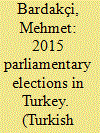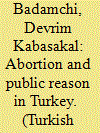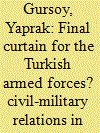|
|
|
Sort Order |
|
|
|
Items / Page
|
|
|
|
|
|
|
| Srl | Item |
| 1 |
ID:
145637


|
|
|
|
|
| Summary/Abstract |
Turkey held two consecutive parliamentary elections in an interval of five months that produced entirely different results. The June 7 elections saw the Adalet ve Kalkınma Partisi (AKP) lose its parliamentary majority and the rise of the Halkların Demokratik Partisi (HDP) as a game-changer. Following the collapse of coalition talks, the subsequent snap elections held on November 1, 2015 took place under a dramatically different context, being marked with issues of security and stability that trumped the issues that were decisive in the June 7 elections, such as the economic slowdown, growing authoritarianism, and allegations of corruption. The electorate's search for a stable and strong government, the AKP's adjustments in an apparent response to the criticisms of the electorate, and the mistakes made by opposition parties gave the AKP the opportunity once again to form a single-party government after the November 1 elections.
|
|
|
|
|
|
|
|
|
|
|
|
|
|
|
|
| 2 |
ID:
129558


|
|
|
|
|
| Publication |
2014.
|
| Summary/Abstract |
During May and June 2012, the question of abortion was hotly debated in Turkish public forums. This paper analyzes the main characteristics of this abortion debate using John Rawls's conception of public reason as a normative framework. In doing so, speeches and declarations on abortion made by legislators are critically evaluated. The arguments in the debate are examined with a view to interpret how the issue should be discussed as far as the demands of public reason are concerned. From a Rawlsian framework, it is observed that the pro-ban position (Adalet ve Kalk?nma Partisi) is far from contributing to a reasonable balance of political values on abortion whereas the contra-ban position (Cumhuriyet Halk Partisi) satisfies the demands of public reason. Moreover, it is argued that, the latest proposed legislation on abortion cannot be viewed as an outcome of a reasonable balance of political values but is rather an outcome of pragmatic compromise.
|
|
|
|
|
|
|
|
|
|
|
|
|
|
|
|
| 3 |
ID:
116405


|
|
|
|
|
| Publication |
2012.
|
| Summary/Abstract |
The CHP is the oldest party in Republican Turkey. After transitioning to a multiparty political system, the party has positioned itself in center-left in the 1960s after holding power in the single-party period. The party was closed in 1981 and reopened in 1992, but it has not been in power ever since. It has been the main opposition party since 2002. In the 2011 elections, the party recorded its best result since 1980, with 25.9 percent of the vote. However, this rate did not satisfy CHP sympathizers. In fact, the party has attempted to enlarge its voting base and reinforce its vision and ideology.
|
|
|
|
|
|
|
|
|
|
|
|
|
|
|
|
| 4 |
ID:
101412


|
|
|
|
|
| Publication |
2011.
|
| Summary/Abstract |
This work compares the technical, economic and environmental (GHG emissions mitigation) performance of power generation and ethanol production from sugarcane residual biomass, considering conversion plants adjacent to a sugarcane mill in Brazil. Systems performances were simulated for a projected enzymatic saccharification co-fermentation plant (Ethanol option) and for a commercial steam-Rankine power plant (Electricity option). Surplus bagasse from the mill would be used as fuel/raw material for conversion, while cane trash collected from the field would be used as supplementary fuel at the mill. For the Electricity option, the sugarcane biorefinery (mill+adjacent plant) would produce 91 L of ethanol per tonne of cane and export 130 kWh/t of cane, while for the Ethanol option the total ethanol production would be 124 L/t of cane with an electricity surplus of 50 kWh/t cane. The return on investment (ROI) related to the biochemical conversion route was 15.9%, compared with 23.2% for the power plant, for the conditions in Brazil. Considering the GHG emissions mitigation, the environmentally preferred option is the biochemical conversion route: the net avoided emissions associated to the adjacent plants are estimated to be 493 and 781 kgCO2eq/t of dry bagasse for the Electricity and Ethanol options, respectively.
|
|
|
|
|
|
|
|
|
|
|
|
|
|
|
|
| 5 |
ID:
098698


|
|
|
|
|
| Publication |
2010.
|
| Summary/Abstract |
The current subsidized energy prices in Iran are proposed to be gradually eliminated over the next few years. The objective of this study is to examine the effects of current and future energy price policies on optimal configuration of combined heat and power (CHP) and combined cooling, heating, and power (CCHP) systems in Iran, under the conditions of selling and not-selling electricity to utility. The particle swarm optimization algorithm is used for minimizing the cost function for owning and operating various CHP and CCHP systems in an industrial dairy unit. The results show that with the estimated future unsubsidized utility prices, CHP and CCHP systems operating with reciprocating engine prime mover have total costs of 5.6 and $2.9×106 over useful life of 20 years, respectively, while both systems have the same capital recovery periods of 1.3 years. However, for the same prime mover and with current subsidized prices, CHP and CCHP systems require 4.9 and 5.2 years for capital recovery, respectively. It is concluded that the current energy price policies hinder the promotion of installing CHP and CCHP systems and, the policy of selling electricity to utility as well as eliminating subsidies are prerequisites to successful widespread utilization of such systems.
|
|
|
|
|
|
|
|
|
|
|
|
|
|
|
|
| 6 |
ID:
114239


|
|
|
|
|
| Publication |
2012.
|
| Summary/Abstract |
After providing a brief overview of civil-military relations in Turkey prior to the June 12, 2011, general elections, this article focuses on the way in which the ruling Adalet ve Kalkinma Partisi (AKP), the opposition Cumhuriyet Halk Partisi (CHP), and the Milliyetçi Hareket Partisi treated this issue in their election campaigns. It argues that the AKP had a dual discourse on civil-military relations and the CHP occasionally showed signs of defending the role of the military in Turkish politics. However, both the victorious AKP and the main opposition CHP adopted policies that accentuated the reduction of the military's role in politics. An analysis of the election campaigns and results suggests that until the next elections, civilian control over the military will further increase.
|
|
|
|
|
|
|
|
|
|
|
|
|
|
|
|
| 7 |
ID:
183746


|
|
|
|
|
| Summary/Abstract |
This article examines developments within the Jewish community in Turkey during and after the Israeli operation in Gaza in 2014 and describes the political relations between Israel and Turkey and its impact on local Turkish Jews. It depicts Operation Protective Edge as one of the peaks of antisemitism in Turkey and considers the question of whether antisemitism in Turkey is related to Turkish-Israeli relations. This study contributes to the scholarship on the perception of Jews in Turkey in light of Turkish-Israeli relations. The paper begins by introducing minority discourse, and then describes the historical background of Turkish-Israeli relations, the perception of Jews, and the effects of the Protective Edge on the Jewish community in particular and on Israeli-Turkish relations in general during that period. Subsequently, the main findings are presented.
|
|
|
|
|
|
|
|
|
|
|
|
|
|
|
|
| 8 |
ID:
180845


|
|
|
|
|
| Summary/Abstract |
In many countries the role of combined heat & power (CHP) generation in the power & heat sector is significant. However, in decomposition analyses of the power & heat sector the contribution of CHP to observed changes in primary energy use or CO2 emissions is generally not made explicit. In this paper, the contribution of CHP is shown for eight countries (China, Denmark, France, Germany, Italy, the Netherlands, Poland and the USA) in the period 2005–2016. In addition, an alternative method is proposed for power & heat sector decomposition analysis with five driving factors: volume effect, subsector effect, heat effect, fuel mix effect and efficiency effect. This method combines indicators from existing decomposition methods and complements them with a CHP specific heat effect. The proposed method provides improved insight in the factors driving change in primary energy use or CO2 emissions in the power and heat sector, especially in case changes take place regarding either 1) the power-to-heat ratio, 2) the share of CHP electricity in total electricity production, 3) the CHP fuel mix, and/or 4) the efficiency of individual CHP fuels.
|
|
|
|
|
|
|
|
|
|
|
|
|
|
|
|
|
|
|
|
|